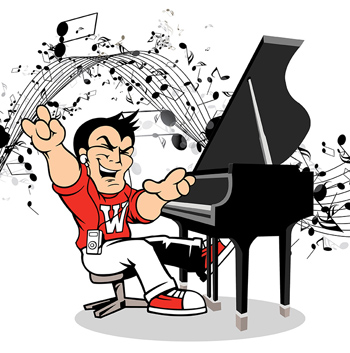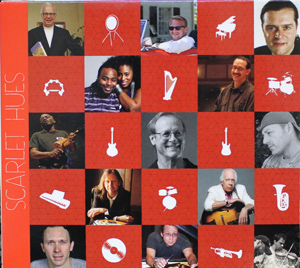 Steve Charles—Making a living as a professional musician requires a “Wabash Always Fights” attitude like few other vocations in America.
Steve Charles—Making a living as a professional musician requires a “Wabash Always Fights” attitude like few other vocations in America.
We may love music, but we prefer not to pay much for it. The Internet has broadened the range of music available, even increased the number of musicians who can reach an audience, but just try to make a living off of iTunes, CD baby, or Pandora if you’re not a mainstream artist.
Which makes the careers of the Wabash musicians I’ve been working with this past month—several who will return to campus Friday for Wally Tunes: A Symposium on Music and the Liberal Arts—even more remarkable.
All of them contributed tracks to a commemorative CD that Media Specialist Adam Bowen and the Wabash Office of Communications and Marketing produced for the Wabash Archives and to be given away to the first 180 attendees at the symposium. All of them embody that “Wabash Always Fights” spirit in their own way as they’ve built liberal arts lives around music. Working with them on this project was one of the great pleasures and honors of my time at Wabash. Just room here for five of the dozens of memorable moments:
 1. We call the CD Scarlet Hues after a song written by Dick Durham ’64, and it’s the final song on the CD. I had emailed Dick to discern his interest in the project, and I found out in succeeding emails that 1. He had recorded a song called “Scarlet Hues”;
1. We call the CD Scarlet Hues after a song written by Dick Durham ’64, and it’s the final song on the CD. I had emailed Dick to discern his interest in the project, and I found out in succeeding emails that 1. He had recorded a song called “Scarlet Hues”;
2. He had dedicated it to Wabash on his solo album, Solilokeys; 3. It was the first song he ever wrote; 4. He wrote it when he was a student at Wabash, only a few years after he began playing piano, which he used to sneak into the Chapel to play. In between emails with Dick, I learned that Sam Vaught ’16 was being interviewed for an article on the Web site and had told us about his own recent experiences playing piano and organ in the Chapel: “I like to go in there whenever it’s not being used – often in the dead of the night – and just play…create so much sound. You can rattle the windows with that instrument.”
I emailed Sam’s comment to Dick, who responded: “Cool—the aura lives on!”
2. Allen Schulz ’87, founder of Random Access Music in New York City and an award-winning composer, wrote a piece for the symposium called 3 Phantasies. Thanks to pianist Diane Norton (Allen’s teacher at Wabash), cellist Kristen Strandberg, and Wabash Audio Technician Phillip Merriett ’08, we were able to include the beautiful second movement of 3 Phantasies as a sort of prelude (a world premiere!). But because we had limited space on the CD, we had to edit Throttle, the other piece Allen had contributed. Rather than getting angry, he gave us permission and thanked us for the work we’d done. The Gentleman’s Rule in music! Philip Seward ’82 was equally gracious when we had to change his selections, as was Professor Peter Hulen when we had to ask him to edit his.
3. No one embodies that “Wabash Always Fights” spirit quite like Dan Couch ’89. He worked 15 years as a performer-then-songwriter in Nashville, currently the most competitive music market in the world, before his songs written with Kip Moore— “Somethin’ ‘bout a Truck” and ‘Hey Pretty Girl”—hit #1 on the country charts. (Read about the “Moment of Inspiration” for one of those songs here.) With that success, Dan’s been crazy busy lately, but he still took time to record “songwriter night”-style versions of those songs—just Dan and his guitar—for the Scarlet Hues CD and worked up a bio and photos for us. When it came in just a day after I’d expected it, he thanked us for our patience! We felt lucky just to have it.
4. I was playing guitar in a jam session with a friend in the pouring rain at the Indiana Fiddler’s Gathering last summer when a guy and his wife in the circle sang a song. The guy played and sang like a pro—way above our pay grade. That’s when I found out we’d been playing with Gordon Bonham ’80, who I had known only from articles that declared him one of the best blues players in the country. Or, as WFYI’s Matthew Socey writes, “one of the best musicians in any genre in the state.” You could tell from his playing, but you would never have guessed that from his generosity and interest in everyone else’s music that night. (He was there, in part, doing research for his “banjo meets the blues” project.) At the top of his game and still learning!
5. I emailed Amos Garrett ’64—one of the most respected players in the world and a guitar hero of mine—not expecting a reply. His kind response was cool enough, his contribution of a track (okayed by his agent and sent from Stony Plain Records) way beyond that. I’ll be interviewing him in March for the magazine (along with several of the folks on the CD) and hope to confirm a story from Jim Durham ’64 that has Jim driving the poet James Dickey to the airport after a Wabash reading, Amos along for the ride, and Dickey pulling out his guitar and playing for them. Got to know if Amos, then 18 or 19, played along.
There’s a story behind every one of these “musical warriors” on that CD—each makes Wabash proud in his own way. Gordon, Allen, Philip—along with Eric Stark ’88, Andrew McKone ’07, and Rick Fobes ’72—will join Wabash faculty at the Wally Tunes symposium Friday. If you’re near campus, I hope you’ll join us in welcoming them home.